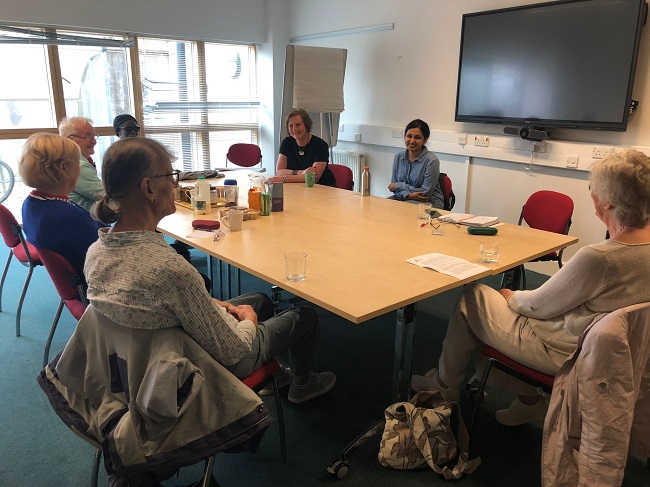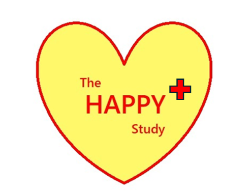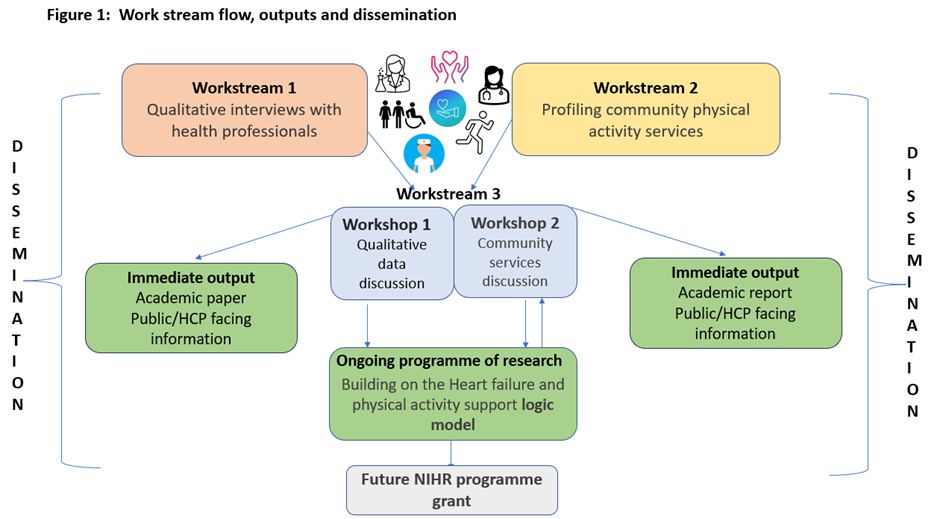How can people with heart failure support themselves in physical activity?
A programme of work into Heart failure And Participation in Physical activitY
About the study
What we are doing and why
In a James Lind Alliance Priority Setting Partnership people with heart failure, family and care professionals agreed that there was uncertainty about how people should approach participation in physical activity after a heart failure diagnosis, even when they are willing to do so.
In this programme of research, we are looking at the ways of supporting people with heart failure to do the amount and type of physical activity that is right for them. Our findings will inform primary and community care professionals about what services and advice should be available.
Who is involved
- Multidisciplinary health care professionals in the community
- Integration Care Boards (ICBs): these are organisations that decide on and provide health services.
- Heart failure charities: we are talking to heart failure charities about physical activity ideas and the programmes they guide people to.
- Patients: we are working with our patient group throughout the study to make sure that the project is relevant to them

Members of the CAPC heart failure patient group
Ongoing research 2024-25

Aims & Methods
- To understand the experiences of GPs and nurses in discussing physical activity with PWHF, and the barriers and enablers to doing so using qualitative interviews .
- To identify what commissioned physical activity services are available in the community for PWHF via Integrated Care Boards in England
- Workshops for final considerations of results, feeding into our previously developed logic model from the original HAPPY study (see below).

Completed research
Heart failure And Participation in Physical activitY (the HAPPY study)
This work was supported by NIHR Research for Patient Benefit (RfPB) NIHR203155 and by the Elizabeth Blackwell Institute for Health Research, University of Bristol and the Wellcome Trust Institutional Strategic Support Fund (Research for Equality, Diversity & Inclusion in Health and Biomedicine). Lorna J Duncan, Rosie Essery, Shoba Dawson, Yasmin Ismail, Justine Baird, Karen Butcher, Emily Whight, Rachel Johnson, Alyson L Huntley (PI)
There were four parts to the HAPPY study.
- A systematic review of qualitative studies describing the experiences, beliefs, and behaviours of people with heart failure in relation to physical activity. using the PROSPERO protocol 2022;
- An embedded Study Within A Review (SWAR) Equity, Diversity, and Inclusion (EDI) thinking in systematic reviews: A study within reviews (SWAR) on EDI tools for the awareness and consideration of EDI in systematic reviews
- A review of physical activity advice from heart failure charities
- A consultation with stakeholders to identify current services and future priorities, using a person-based approach to develop guiding principles and a logic model to explain the main problems people with heart failure have with physical activity.
Full study paper currently under review ( July 2024)
Self-management strategies in people with heart failure-related fatigue: a systematic review. This work was supported by the National Institute for Health Research School of Primary Care Research (NIHR SPCR) as part of the Evidence Synthesis Working Group (ESWG) [Project Number 461]. Lorna J Duncan Beth Stuart, Clare J Taylor, Rachel Johnson (Co-PI) , Alyson L Huntley Co-(PI)
Contact
For further information, contact alyson.huntley@bristol.ac.uk

